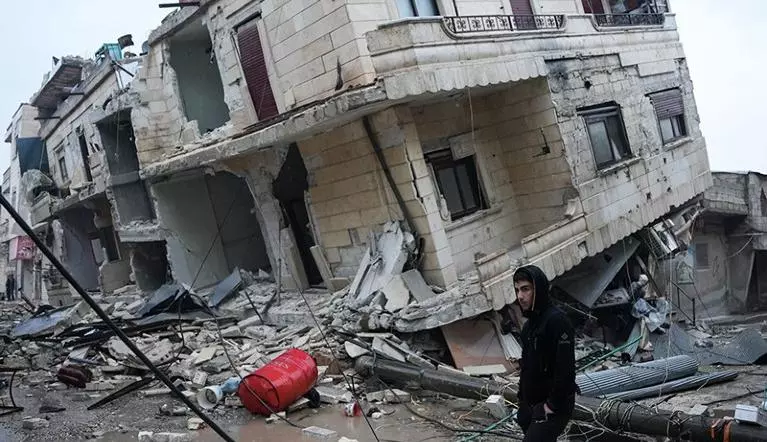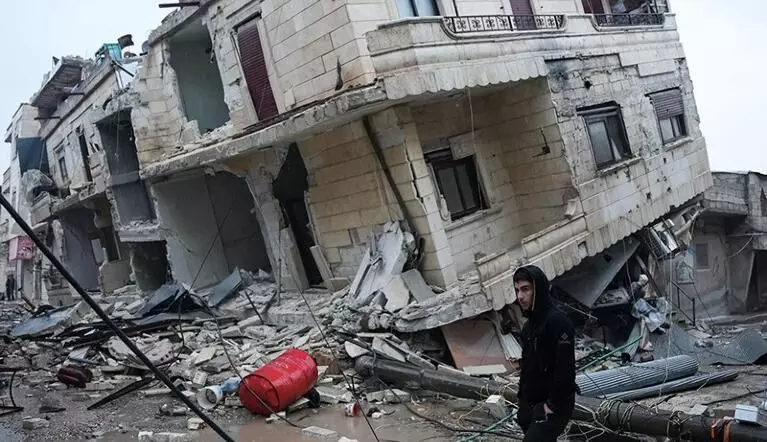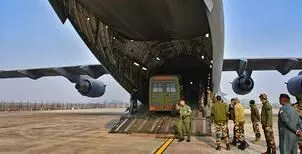
The Turkish tragedy
text_fieldsThe devastating earthquake in Turkiye and Syria has caused shock and sorrow not only in the region but also in the whole world. The first quake on Monday morning was itself turbulent and terrifying. The earthquake of magnitude 7.8, 7.6, and 6 not only shook Turkiye, but their effects were also felt in Cyprus, 400 km away, and Egypt, Lebanon, and Israel, 1,400 km away. Gaziantep, a city with a population of 20 lakhs was the epicentre of the earthquake which resulted in massive loss of life. The region witnessed its most powerful earthquake in the last 100 years, with two earthquakes with a magnitude more than 7 and over 40 aftershocks after the first tremor. The preparedness for such a catastrophe was minimal in a place where there hadn't been a significant earthquake in 200 years. The previously recorded earthquake of magnitude 7.4 in August 1822 was less powerful than the current magnitude of 7.8. However, experts also recall that the earthquake in the 19th century killed 7,000 people in the Syrian city of Aleppo alone, and the damagingaftershocks lasted for a year. There are fears that similar aftershocks may occur this time as well.
At the time of writing this, the death toll is reported to have exceeded 16,000 - two-thirds of them in Turkiye and most of the rest in Syria. The death toll is likely to increase. The severity of the earthquake is not the only factor affecting the death toll. The condition of the buildings and the timing of the earthquake are also crucial. The death rate is likely to increase as the quake hit in the winter dawn at four am. It is pointed out that the buildings in this region (particularly in Syria) are not earthquake-proof. A total of over 2,800 buildings collapsed in the Turkiye-Syria border region and cracks were reported at Turkiye's Hatay airport runway, while about a thousand buildings fell near the epicentre. Close to half a lakh people were injured. And these are all official figures.
Although the rescue efforts are progressing well, it was alleged that rapid response was not given in the initial stage. Aid is pouring in. The European Union has announced an aid of 3.5 lakh euros for Syria and 3 lakh euros for Turkiye as a first phase. The Turkish government stated that a total of 1 lakh people are involved in the rescue operation, including teams from Britain, the United States and China. The immediate need at such a stage is to prevent deaths and to provide medical aid, shelter, clothing and food to the injured. The night temperature in Gaziantep, the epicentre of the earthquake, is -7. Robert Holden, head of the World Health Organization's disaster response department, says that if the temperature drops further, thousands of lives will be at risk. As many as two crore people, mostly children, are expected to be more or less affected by the earthquake and need to be provided with food, shelter and heating equipment for protection against the cold. This cannot be carried out by Turkiye alone. Erdogan's statements in his capacity as president are reassuring, but he has come under fire from the Turkish opposition for the lack of emergency aid. He even admitted later that it was difficult for them to prepare for a catastrophe of this magnitude.
India also rose to the occasion in rescue and relief measures. The National Disaster Response Force (NDRF) and Army Medical Team rushed to the area. Over the past few years, India has demonstrated its readiness for action in emergency relief efforts in numerous locations, including its neighbours. We can anticipate that the NDRF's actions during the tsunamis of 2004 and 2011, Cyclone Nargis in Myanmar, and earthquake-stricken Nepal will be repeated in Turkiye. At such a stage of earthquake, more than funds, human resources, expertise, and efficiency are more important. The necessity for follow-up services and reconstruction projects following an emergency, however, will make financial aid more crucial. More than that, international nations must work together. With all of that, India and the rest of the world are praying and hoping that Turkiye can quickly recover from the current disaster.


























